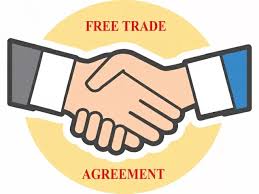Free Trade Agreement (FTA):

The External Affairs Minister stated that India is taking a cautious approach to FTAs to protect farmers and MSMEs, as discussed at the Bharat@100 Summit by ASSOCHAM.
- Free Trade Agreements are comprehensive trade deals between two or more countries, aimed at reducing or eliminating trade barriers such as tariffs and import/export restrictions.
- These agreements provide preferential access to markets by offering tariff concessions and lowering non-tariff barriers.
- FTAs cover trade in goods (agricultural and industrial products) and trade in services (banking, IT, construction).
Advanced FTAs may include chapters on investment, intellectual property rights (IPRs), government procurement, and competition policy. - Types of Trade Agreements:
- Partial Scope Agreements (PSA): Focus on a limited number of goods.
- Free Trade Agreements (FTA): Reduce tariffs between member countries while retaining individual tariff policies with non-members.
- Customs Union: Includes a common external tariff for non-members.
- Common Market: Facilitates free movement of goods, services, and factors of production.
- Economic Union: Coordinates macroeconomic and exchange rate policies among member nations.




